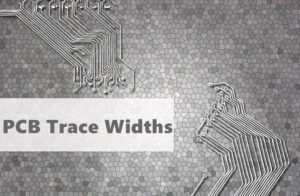PCB Trace Widths and Precautions
2022-10-12
No matter what industry you are in, you probably use products or equipment containing printed circuit boards every day. Regardless of the type of PCB you use, they should be designed with the proper trace width for operation.
PCB Trace Width
Trace widths are measured in mil or thousandths of an inch. Generally speaking, the standard trace width is between 7-12 mil. Typically, 10 mil is chosen for low frequency and small currents, and high-density PCBs may require trace widths as thin as 2.5 million.
PCB trace width determinants
- The size of the current
- Working frequency high or low
- PCB board area and complexity
PCB trace width in the layout of the role
Trace width affects the electrical performance of the PCB, including
Signal Integrity
Using different trace widths can improve signal integrity and control signal interference, crosstalk, etc. When it comes to certain high-speed signals, they need to be routed at a specific width for impedance control. Calculation of the trace width needs to be based on the following factors.
- Dielectric material
- Spacing to other signals
- Copper weight
Power Integrity
To ensure power integrity, here are a few tips to consider.
- Keep the traces short and direct
- Use wide traces
- Consider heat dissipation and current levels
PCB layout considerations
- The first principle of layout is to ensure the cloth through rate of wiring, pay attention to the connection of flying wires when moving devices, and put devices with connected relationships together.
- Digital devices and analog devices as far away as possible
- Decoupling capacitors as close as possible to the device's VCC
- Place devices not too dense.
- More use of Array and Union functions provided by the software to improve the efficiency of the layout.
How to choose the best PCB trace width?
PCB layout engineers can design multiple PCB CAD tools to control the width of the trace by specifying the width and spacing of each network to control the individual networks. Using CAD tools can also set the network category. Some CAD systems also offer the ability to set different rules for specific areas. This can be very useful as you move through dense areas.
Choose a strong PCB contract manufacturer
To ensure proper use of tools to meet the highest quality standards for PCBs. kingPCB takes many effective steps to meet your PCB manufacturing requirements, providing quick turnaround and on-time delivery for your customers.
Provide us with your PCB Gerber files and BOM sheets via email and we'll get back to you with an answer and quote as soon as possible!



